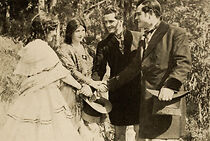|
Young Sam, who represents “Me,” and young Bill come on the scene, a pair of barefoot boys on their way to school. They stop at the old swinging gate, and there come young Jean and young Kitty, misses of tender years, who are met by the barefoot boys and permitted to carry their luncheons and books as they trudge away down the lane toward the little old red schoolhouse. After school the returning scene repeats, and the youthful gallants part from their little sweethearts with a the sun sinks low in the west. The scene sweeps to manhood. The boys, “Me an’ Bill,” call upon and court the dainty and demure maidens, Kitty and Jean, “standing with reluctant feet, where the brook and river meet.” They wander in company down the woody aisles of the forest; they are seen far out on the lake drifting idly in a canoe, then follows the plighting of troth and finally marriage. Then comes the greatest epoch of life, motherhood. Jean bears a son, and Kitty a daughter, marking the beginning of the second generation. Time flies and the babies grow to manhood, to womanhood. Love buds in their hearts, and their parents look forward to a fresh alliance with fond hope. About this time the beautiful mother, Jean, fades like a delicate flower in the glory of womanhood and dies, and her husband, Sam, now silvered about the ears, is left to walk alone and in the shadow. A cloud no larger than a man’s hand brings darkness over the land; the wild drumbeat of war is heard, and brother confronts brother upon the field of battle in the great civil strife of ‘61. Sam’s boy marches away to the battle front under the banner of the Union flag, leaving his sweetheart, Bill’s girl, thinking proudly of the hour when her soldier lover will return to her in triumph. Alas, Sam never comes back. The scene changes to the vivid and spirited episodes of war, of conflict and of carnage. Sam, the intrepid soldier, while rushing ammunition forward in the face of the enemy, is slain by a bursting bomb. Then slowly the news drifts back north, and the old men who live from day to day reading their papers with eagerness see that dreadful column, double-leaded, and leading all the rest is Sam’s name among the “missing.” They know too well what this means. As the old men bow their heads in grief, Kitty comes in, snatches the paper, learns its dreadful import and slips silently away to sob out her grief alone. She goes down to the old mill stream, pushes out in the clumsy flatboat, buries her head in her hands, and then as the craft strikes an eddy it overturns and she is drowned. In the course of time the entire community is enlisted in a search. They find Kitty’s body like another Ophelia, at rest amid the watery reeds and rushes. It is now Sam’s turn to comfort the bereaved Bill, and he pushes aside his own sorrow to meet this new emergency as only a lifelong friend can. Alone in the world, bravely facing the darkling shadows, the two old friends, leaning the one upon the other, trudge homeward in the gathering gloom of the nightfall. |
||
| Ratings: | IMDB: No rating yet | |
| Released: | June 22, 1914 | |
| Genres: | Drama Short | |
| Countries: | United States | |
| Companies: | Selig Polyscope Company | |
| Cast: | Wheeler Oakman Bessie Eyton Guy Oliver | |
| Crew: | Colin Campbell | |



Noamen : I was able to sit through it all, so it wasn't horrible. I'd give it 2.5 if I was able - ...